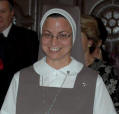 ABANDONMENT
TO MERCIFUL LOVE
ABANDONMENT
TO MERCIFUL LOVE
Sr.
Silvia Maria Tarafa, SCTJM
For private use only -©
We left off our last conversation speaking about trust. Today I
wanted to highlight one aspect of what this trust entails, and our
need for it in order to answer God’s calls on our lives.
“Those who are well do
not need a physician, but the sick do. I did not come to call the
righteous, but sinners.” (Mk 2:17). Sometimes we do not follow the
Lord’s call to religious life (or His invitations to growth within
religious life) because we are so aware of our sinfulness. And yet,
it is precisely here, in this awareness that lies our wealth. For no
covenant relationship with the Lord can reach maturity without our
awareness of our poverty, our need for the Lord.
If we think we have
everything we need within ourselves because we are good, or because
we believe we have it all together, sooner or later we will have a
rude awakening. It is precisely in our nothingness, actually not
just in our nothingness-(for God himself knows we are but dust), but
precisely when we become aware of our nothingness that we permit a
our relationship with the Lord to blossom. (cf. Psalm 103:14). When
we acknowledge our weakness, limitation and need for the Lord’s
merciful love, then we invite the Lord to be great- to be bountiful
in us; we give the Lord permission to supply for all we lack, to
pour His abundance on our poverty. I believe this is what He means
when He tells us, “Blessed are the poor for theirs is the Kingdom of
God” (Lk. 6:20). Our Lord in His merciful love held nothing back
–even giving us the last drops of His Blood. So we can trust that
His provident, generous, compassion will be bountiful in us. He also
promises us that: “[He] will supply all our needs according to His
riches in glory” (Phil.4:19). “And He who has begun the good work in
us will bring about its fulfillment” (Phil.1:6).
This is precisely the
gospel, and what St. Therese of Lisieux came to clarify for us- to
reignite the Lord’s invitation for us to have an absolute
abandonment to His merciful Love- even and precisely because of our
sinfulness. Pope Benedict XVI said: “Here in [St Therese] is the
secret of sanctity for all the faithful throughout the world. Pope
Pius XII said: “We must take St. Therese at her word when she
invites the most unregenerate as well as the most perfect to count
nothing of value before God save the radical weakness and spiritual
poverty of a sinful creature.”
So just what did St.
Therese say that is helpful for anyone hesitating because of their
nothingness -to say yes to God’s call or to deepen their
relationship with Him? A summary of her little doctrine can be found
in a letter to her sister Sr. Marie of the Sacred Heart of Jesus:
“My darling sister…. understand that in order to love Jesus, the
weaker one is, with neither desires nor virtues, the more one is fit
for the workings of this consuming and transforming Love. The sole
desire to be a victim [of his Love] suffices, but one must consent
to remain always poor and utterly weak…. Let us love our littleness,
let us love to feel nothing, and we shall then be poor in spirit and
Jesus will come to look for us, however far away we are. He will
transform us into flames of love. …. It is confidence and nothing
but confidence which must lead us to love. … What pleases Him is to
see me love my littleness and my poverty. It is the blind hope I
have in his mercy…. There is my only treasure. (Letters 9/17/1896).
So we see from the life
of this Doctor of the Church, from the Pope’s desire we imitate her
life and from the Scriptures themselves that those being called
cannot be held back by their nothingness; we recall He only calls
sinners.( Mk 2:17). Rather, may this humbling awareness of our
poverty and the simultaneous awareness of God’s bountiful mercy
(willing to pour out His all on His poor children) may these spring
all those being called to religious life or to deepen their
religious life- to abandon themselves completely into His
compassionate Arms.
This page is the work of the Servants of the Pierced Hearts of Jesus and
Mary